Black, white and shades of grey – what’s behind sprint’s race divide?
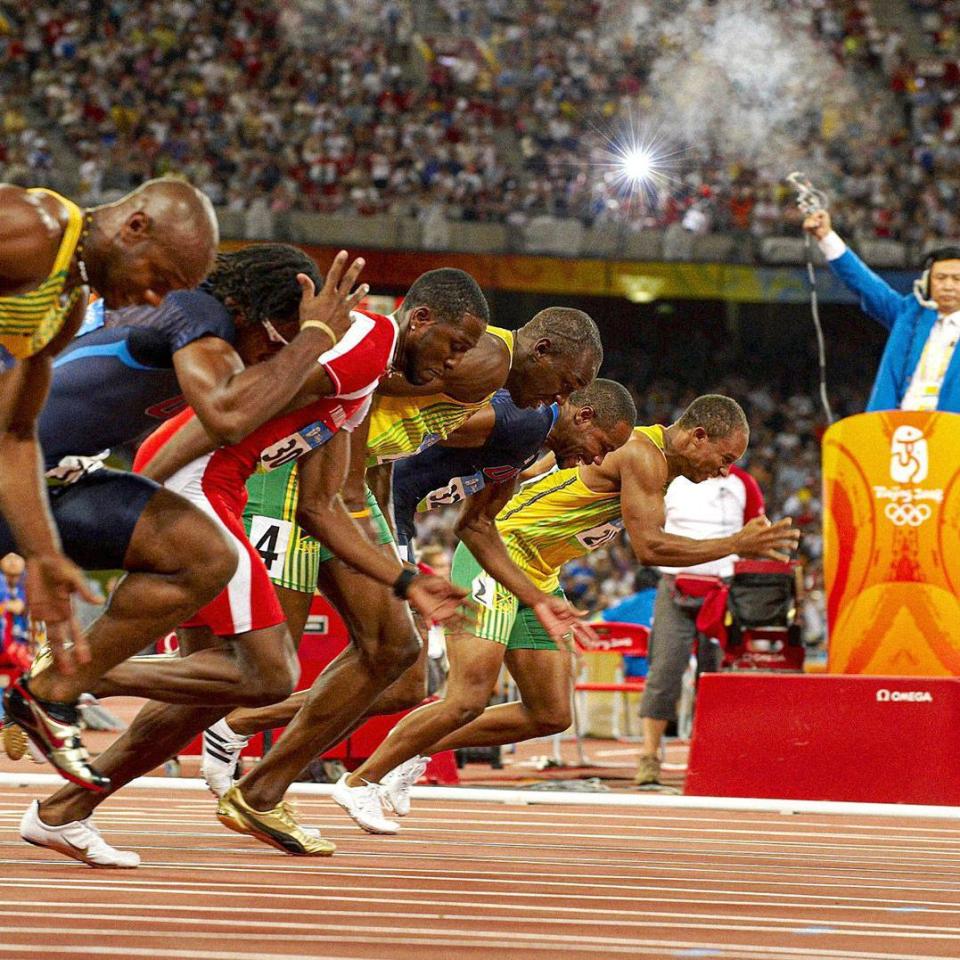
Sign up for notifications to the latest Insight features via the BBC Sport app and read the latest in the series here.
In late 2009, the question everyone was asking was put to the man himself.
What made Usain Bolt – an era-defining champion of immense speed and consummate ease at just 23 – so fast?
Bolt cited his God-given talent, while crediting a diet that ranged from ultra-processed chicken nuggets to the Jamaican staple of yams. But he also pointed to the cruelties of man.
"I think over the years what makes Jamaica different is because of slavery really," he said of his sprinting roots. "The genes are really strong."
It is a hypothesis that existed before Bolt's comments and has persisted since; that the barbarity of the slave trade, which forcibly took men, women and children from Africa and exported them into forced labour in the Caribbean, Brazil, the United States and elsewhere, still echoes in modern-day track and field.
The theory runs that the unnatural selection of black physical prowess centuries ago affects podium potential today.
Not since British sprinter Allan Wells triumphed at the boycott-hit Moscow 1980 Games has a white man made an Olympic or world 100m podium.
In fact, it was more than four decades after Wells' triumph that China's Su Bingtian became the next man without black parentage to even compete in an Olympic 100m final, in 2021.
During that time, black sprinters from North America and the Caribbean have claimed 24 out of 30 medals in the men’s 100m at the Olympics.
But was Bolt right? Does the link between modern glory and a dark past hold true? Or are appearances deceiving?
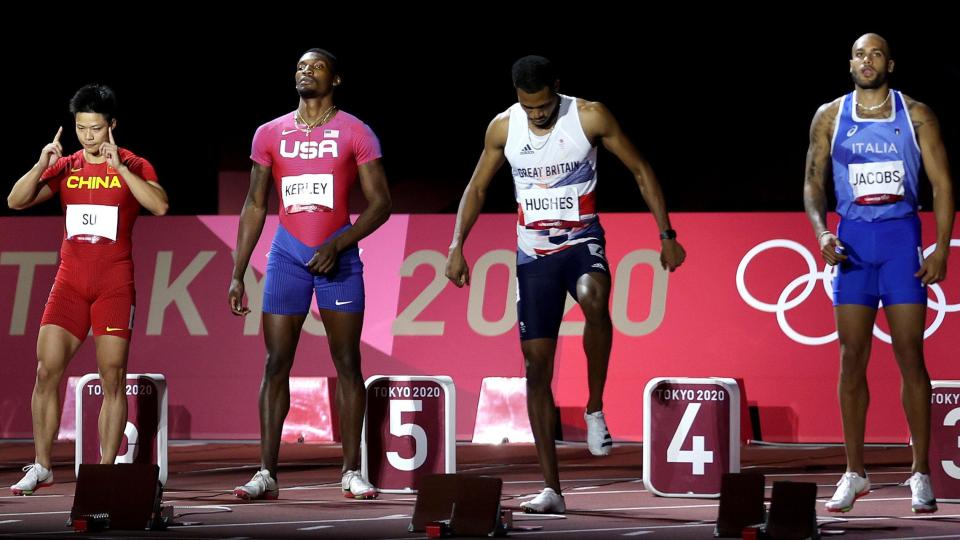
In September 1995, Sir Roger Bannister, the first man to run a mile in less than four minutes and an eminent neurologist, stood up to speak at a conference in Newcastle.
"As a scientist, rather than a sociologist, I am prepared to risk political incorrectness by drawing attention to the seemingly obvious but under-stressed fact that black sprinters, and black athletes in general, all seem to have certain natural anatomical advantages," he said.
Bannister would concede that he was unable to identify what those precise advantages were.
But, he insisted, it was correct to note the apparent correlation between race and sprint medals, and seek to explain the underlying factors he believed were behind it.
The response was mixed.
Some disagreed with Bannister on principle, suggesting that such an argument risked slipping into the territory of the eugenics movement that had given a sheen of scientific respectability to racism around the world in the early 20th century and was a key part of Nazi ideology in Germany.
Others argued that race is a social, rather than biological, construct, and to merge diverse populations from a range of continents into one homogenous group based on skin colour is nonsensical.
"From the Enlightenment all the way through to the present day, there has been a science around racial typology and the belief in meaningful difference along the lines of skin colour," explains Dr Paul Campbell, associate professor of sociology at the University of Leicester.
"Yet we don't look at this in any other way. We don't look at the differences in eye colour or hair texture, despite the gap between people, in terms of basic DNA, being just as wide as skin colour.
"So why is there a fascination with continuing to try to explain meaningful racial differences? The idea that there is a clustering of a certain group of people in a certain discipline, somehow makes people assume there is causality."
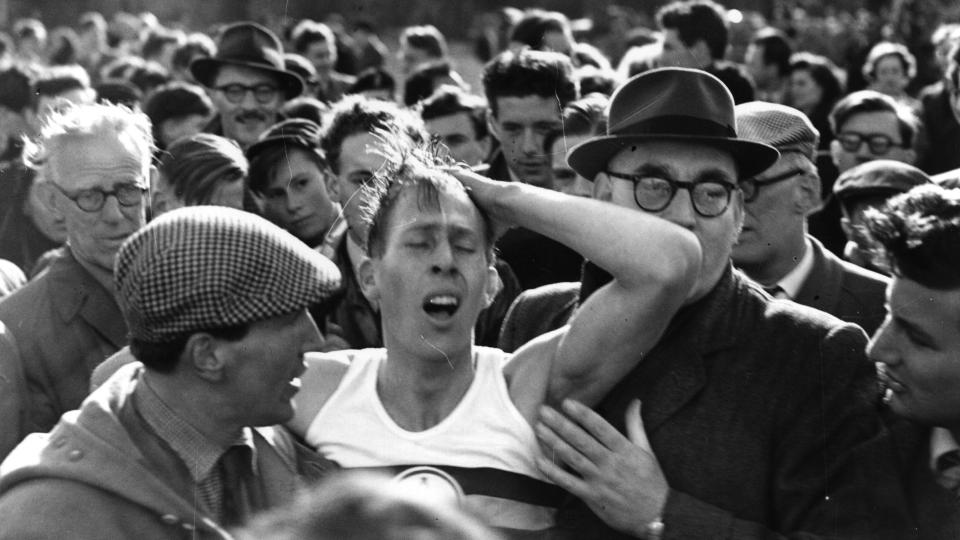
Yet the extrapolation some have made is startling; that slavery turned sprinters of West African descent into world beaters.
An estimated 10 million slaves were transported by ship from Africa across the Atlantic between the 16th and 19th centuries, with appalling conditions onboard meaning many never arrived at their destination.
This was combined with a rigorous physical selection process prior to boarding the ships and selective breeding by slave owners at the other end.
The result, it has been argued, was to create a population of West African descendants in the United States and the Caribbean that was predisposed to athletic performance.
Many feel this diminishes black sprinters' hard work, and the hunt for a specific gene to strengthen such a theory with scientific evidence has not proved successful.
It was in 2003 that a group of Australian scientists first thought they had struck genetic gold. The gene in question was Alpha-actinin-3 (ACTN3), and the academics involved identified that the more copies of the R variant a person possessed - and therefore the less of the X variant - the more likely they would excel at sprint and power disciplines. So far, so good.
A number of studies showed people of West African origin were almost guaranteed to have the right variant of the so-called 'sprint gene' to run fast.
But there was a problem: further testing found virtually all Olympic sprinters of every nationality and ethnicity also possessed it. So did billions of other people.
"All that ACTN3 can tell us, it seems, is who will not be competing in the [Olympic] 100m final," wrote David Epstein, in his book The Sports Gene.
"And it is not even doing a very specific job of that, given that it is only ruling out about one billion of the seven billion people on earth."
Other, alternative theories for an apparent racial sprinting divide have also arisen over the years.
One disputed study by scientists Adrian Dejan and Edward Jones, published in the International Journal of Design & Nature and Ecodynamics, suggested people of West African origin benefited from a higher centre of gravity than white people, providing them a 1.5% advantage over the course of a 100m race as they were able to fall to the ground more quickly between strides.
Another built on the high prevalence of sprint-aiding fast-twitch muscle fibres, which tire easily but contract quickly, among black populations.
Scientist Errol Morrison and author Patrick Cooper's controversial hypothesis, published in the West Indian Medical Journal, was that the prevalence of sickle cell trait - a mutation that causes round, red, oxygen-carrying blood cells to curl up in a sickle shape - among people of West African origin had "triggered a series of physiological adjustments, which, incidentally, had favourable athletic consequences".
Prime among them was "a higher percentage of fast-twitch muscle fibres", which are less dependent upon oxygen.
Yet the theory was just that: a theory. No supporting data has ever been produced and, according to scientist Yannis Pitsiladis, it is unlikely it ever will.
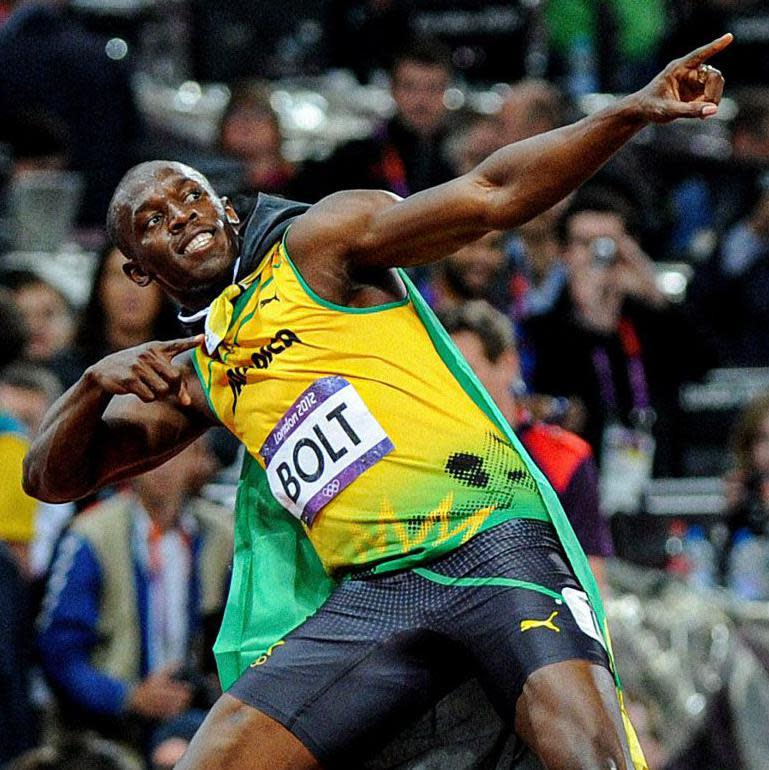
In an academic career during which he has conducted research out of universities in Glasgow, Brighton and now Hong Kong, Pitsiladis has built up the largest known DNA bank gathered from international athletes anywhere in the world.
He, more than any scientist globally, has delved deepest into determining whether sporting success can be found in genes. His conclusion, after decades of studies, is eye-opening.
"Genes are of paramount importance, and without the right ones you cannot have success," he says. "If you put people with the wrong genetics in the right environments, they will have no success, but it is not linked to the colour of your skin,” Pitsiladis says.
For Pitsiladis, genetic heritage is specific and shorter term.
“The reality is that it's the genes of your parents that dictate athletic ability or anything else, not the genes associated with your skin colour," he says.
Pitsiladis' research has led him to conclude that things are not what they seem. Just because no white man has won an Olympic or world 100m medal for 44 years, does not mean they are inherently slower than black sprinters.
To suggest so is to ignore a multitude of crucial cultural and environmental factors.
Pitsiladis originates from Greece, one of the top basketball nations in Europe.
He explains: "Greeks don't have basketball genes, but everyone plays it in Greece so of course they are going to be good at it."
This, his extensive research has found, is the key to sprinting success.
In spite of wholesale racial theories espoused by the likes of Bannister, no West African country - from Ivory Coast to Ghana and Senegal to Mali - has ever produced a single individual male Olympic or world medallist over 100m or 200m.
The impact of an Atlantic crossing – on which it is estimated that death rates were around 10-20% - brutal labour on arrival and owners’ selective breeding of slaves shaped the black population of the Caribbean and North America.
But so did Jamaica and the United States’ athletics heritage and infrastructure.
West Africa lacks both. So does Brazil, which is estimated to have been the destination for between 4 and 5.5 million African slaves – many times more than went directly to the United States.
Every Easter in Jamaica, the Inter-Secondary Schools Boys and Girls Championships - the competition better known as Champs - features the island's best high-school athletes competing inside Kingston's National Stadium. The event attracts 35,000 spectators, occupies newspaper front pages and leads TV bulletins.
"Everyone in Jamaica will sprint at some point in their lives because they believe they are sprinters by birth and sprinting in Jamaica is practically a religion," explains Pitsiladis.
"Most will realise they are terrible at it, but the good ones come to the top and there is an environment which allows that to happen.
"Usain Bolt is totally wrong if he believes his genetics are better through slavery. But I would never tell him that because then I would take away his superpower."
Incidentally, Pitsiladis suggests similar cultural - rather than physical or genetic - factors have been key to East African dominance of long-distance races over recent decades.
From 1920 to 1936, athletes from Finland and Sweden won 25 of the 30 available Olympic 5,000m and 10,000m medals.
As those nations have faded, distance running has become a national sport in Kenya and Ethiopia, where there are also natural physiological benefits to be reaped from training at high altitude.
Campbell subscribes to the idea of a self-fulfilling prophecy around racial stereotypes in sprinting.
He suggests that while divisions along racial lines are obsolete in most parts of society, "myths" around black people continue to prevail in three distinct areas: sport, sex and dancing.
"If you [as a black person] believe you have innate abilities and they are reflected in the environment around you, then you are more likely to invest in the things you perceive you are good at," he says.
He explains that sprinting is seen as a safe place where black people might feel they can belong and excel.
When France's Christophe Lemaitre became the first white man to break 10 seconds for 100m in 2010, he made global headlines for the colour of his skin. A subsequent invitation he received to attend a Ku Klux Klan meeting showed the dangers of such a narrative.
Richard Kilty, the last British man to win a global sprint title with world 60m gold in 2014, says other people frequently pointed out his white skin colour before he reached elite level.
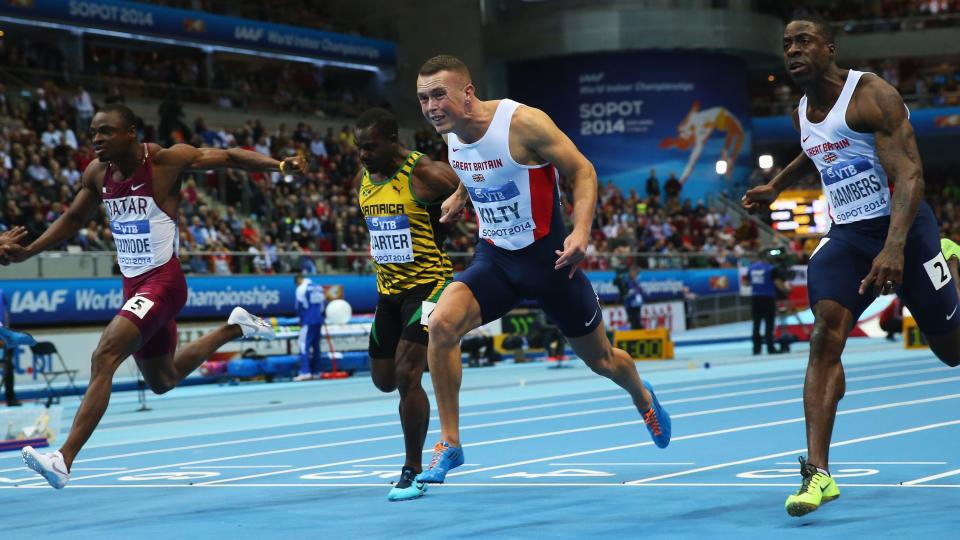
"It was certainly something I was aware of because I was told a lot of times when I was younger that white people were at a disadvantage," he says. "I just never believed it.
"I never once got on a start line and felt different to everyone else. But a lot of other people planted those seeds in my mind."
Campbell explains that race also serves as a "proxy for other social conditions".
In countries such as Britain and the United States, statistics show that black people are more likely to be working class, have negative experiences of education and have limited opportunities in various occupational fields.
Campbell says acknowledgement of a racially unjust society is therefore imperative in viewing a perceived predominance of black athletes in certain sports.
"A black sprinter might potentially be an even better golfer than they would be good at athletics, but they probably wouldn't have that opportunity to demonstrate a propensity or aptitude for it," says Campbell. "So it is driven by economic realities."
Rather than asking why black people might seemingly be over-represented in elite running, the more pertinent questions are why relative numbers are so low in skiing, professional sports coaching or further education.
Outliers, of course, exist.
University graduate Dina Asher-Smith, Britain's most recent global sprint champion who won world 200m gold in 2019, has spoken of people assuming she is from an impoverished background based purely on her skin colour, despite being raised in a stable, financially comfortable family home.
The women's sprinting landscape raises further doubts over the veracity of any theories around black racial superiority.
While it has produced a broadly similar pattern of medal winners to male sprinting, the Netherlands' five-time Olympic and world sprint medallist Dafne Schippers is among a number of non-black athletes to make global podiums this century.
This January, Pitsiladis conducted a university lecture in Hong Kong where he asked his students - a cohort that included a number of elite athletes aiming for the Olympics - how many believed racial genetics were key to success.
Three-quarters of the class raised their hands.
"The implication was that Asians can't sprint as well as black people," he says. "It meant they had effectively lost the race in their heads before it had even begun because they believed other people had better genes."
They are far from alone.
The ubiquity of three black athletes standing on a global sprint podium has created a dogma of biological superiority that decades of scientific evidence has so far been unable to support.
But the belief remains strong and perception is powerful - it can make or break champions.

